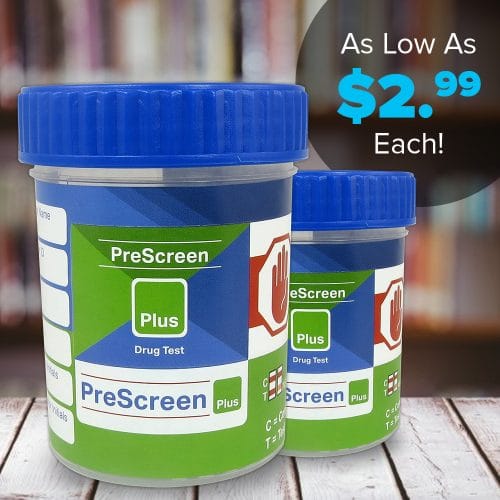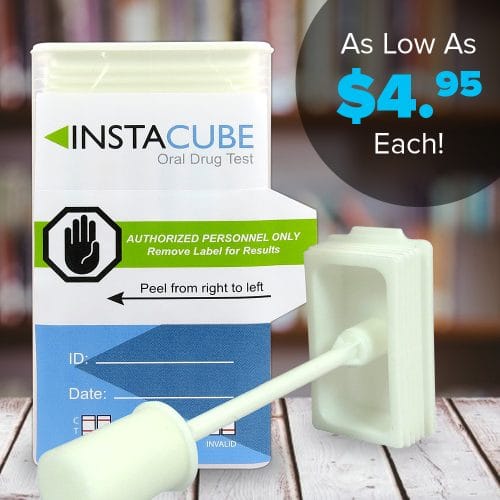Testing for drugs has never been easier with the variety of tests available on the market. The most common way to drug test is with urine tests. Here’s a look at why this method of drug screening is so popular.
Overview
Drug tests are not just for pre-employment screening, or for rehabilitation clinics. Doctors and hospitals regularly test patients to evaluate the cause for a medical or behavioral condition. Drug tests are also used by individuals to ensure that loved ones are not engaging in drug use.
Ready to order or have questions? DrugTestsInBulk.Com has a professional staff ready to answer your questions and to help you place your order today. Call us today at 866.461.7806. Ask us about our special pricing and how you can sign up to receive our newsletter and product promotions. Call Today!
A major benefit of urine drug screening is that it effectively prevents those with drug problems from entering a job where they could impact productivity, or even endanger the lives of others. For instance, a commercial truck driver would need to be drug free in order to safely operate a commercial vehicle. In the event that the driver gets into an accident, being able to verify that the driver is not on drugs rules out a serious case for liability, saving the trucking company from significant losses.
Testing for drugs with a urine cup is also an easy method for drug testing at home. For example, parents may require that their teens take a urine test every six months as part of maintaining a drug free home. When drug testing becomes the norm, teens may decide that taking drugs is not worth the consequence of losing the privileges they are granted by simply being drug free.
When a Drug Test is Needed
Determining when to drug test and what substances to include in the screening process depends upon the needs of an individual or company. In the case of rehabilitation clinics, each time a patient comes in, they will be tested for substances. In the workplace, employees are ordinarily tested during the pre-employment interview process, after an accident occurs in which they were involved, or as a result of reasonable suspicion due to behaviors noted by management. Some workplaces conduct periodic or random testing to enforce their drug-free policy.
To deter employees from abusing alcohol and drugs, employers create substance abuse awareness programs and implement drug testing to keep employees educated on the risks of drug use. These workplace wellness programs offer alternatives to taking drugs in order to manage common workplace conditions like stress, anxiety, and other forms of mild work-related pain. By replacing the addictive behavior with more positive practices, employees are encouraged to adopt a healthier lifestyle when they are on and off the clock.
Drug Testing Safely
The utmost concern of any testing procedure is safety and fairness. Urine drug testing is a popular means for testing due to it’s non-invasive approach that gets very accurate results in a short period of time. Whether the test is administered by an outside laboratory, or an in-house testing administrator, the process is the same, and must be the same for each employee regardless of their position at the company.
Specimen cups are handed out by a testing administrator. Those being tested will be required to leave all belongings behind and empty their pockets while they go into a bathroom. Sometimes a same-gendered technician will be present to ensure that testing procedures are followed. Those being tested must provide the designated amount of urine, which is less than a typical trip to the bathroom. The technician and testee then return the samples to the testing administrator for evaluation.
Unlike a blood or hair follicle test, urine drug tests are a painless testing method that screens for a wide variety of illicit drugs. Whereas most laboratory tests used for pre-employment screenings only test for the major illicit drugs like amphetamines, cocaine, barbiturates, opiates, THC, and methamphetamines, instant tests now have the capability to test for all of these plus specialty drugs like ecstasy and K2/Spice that ordinarily come at an additional cost at a lab.
How Instant Urine Drug Tests Work
Urine drug tests, particularly those of the instant test variety, do not score according to exact numeric thresholds, but have urine concentration cut-off levels which indicate if enough of a substance is present to cause the testing strip to change color. This means of testing is most successful, because it eliminates a false positive due to consumption to traces of certain foods or medications that are not considered a danger when taken in very low, responsible doses.
To further ensure that testing is fair, urine drug tests work to detect the presence of drug use within a certain timeframe that would indicate recent use. Some drugs leave traces in the system for longer than others. Likewise, the more a drug is used, the longer it takes to leave the system. Marijuana or PCP, for instance, can be detected in urine for up to 30 days after use. However, most drugs take between 2-4 days to leave the system.
Some substances which could produce a false positive result might be surprising. Taking some over-the-counter medications for a cold, flu, or sinus infection might cause a positive result for amphetamines. Some pain medications like naproxen or ibuprofen can create a false positive for THC. Eating poppy seeds are a popular culprit for opiate traces on a drug test. While the likelihood of a false positive is possible, simply being open about which foods and medications you have taken before going in for a drug test will eliminate the possibility of being falsely evaluated.
How Urine Samples Are Processed
When testing administrators collect samples, results are indicated with a simple pass or fail under the column for each substance for which screening occurs. In the event that a test comes back positive, it is advisable to ask the testee to take a second test immediately to ensure that the results are accurate. There is a very small chance, 1% to be precise, that the results are not accurate, but it helps to have this added assurance, since many consequences arise as a result of a positive drug test.
Urine drug tests should not be confused with a clinical urinalysis. A clinical urinalysis is a more complex test that screens for a wide range of chemical and biological casts in the urine which helps doctors and nurses identify and diagnose more serious medical conditions such as urinary tract infections, liver complications, kidney disorders, metabolic conditions, and more. The purpose of a urine drug test is not to detect medical complications, but to determine which illicit substances are present in the urine.
Detecting Adulterants in Drug Tests
As with any test, there are always those who try to cheat their way through a drug test. Tampering with a urine sample is considered just as serious if not equivalent to getting a positive result. Ways that people attempt to beat drug testing when taking a urine test include taking products which promise to dilute urine in order to lower substance thresholds. The problem with these products is that now many tests can detect other traces left behind of substances which are not normally present in human urine, such as bleach or unhealthy levels of iodine.
Another method used for cheating on a drug test is by substituting urine by either purchasing someone else’s urine, or by purchasing synthetic urine. These ways of cheating usually run into issues due to the unnatural temperature levels of the sample, since many tests traditionally have a temperature indicator to verify that the sample is fresh.
Synthetic urine runs into a number of issues since there are chemical and physical properties present in the fake urine which do not naturally occur in human urine, making the false sample pretty obvious to an experienced testing administrator. No matter how many products reach the market to tamper with urine collection, testing technicians and drug test developers stay on top of these developments to ensure that testing remains fair and accurate.
The Best Way to Pass A Drug Test
It may seem a little obvious, but the best way to pass a drug test is not to consume illicit drugs. Addiction is considered a disease, and there are many reasons as to why individuals become dependent upon substances. While genetic factors come into play about half of the time, most addictions are a greater combination of biological and environmental influences in addition to adopted behavioral patterns. Many employers now offer programs to help existing employees recover from addiction while allowing them the opportunity to keep their jobs while they get help.
Advocates for drug testing provide many reasons why the workplace is better off with “No Tolerance” policies. Some employers now even have “Tobacco Free” policies in place which eliminates smoking at work, and others encourage non-smoking by offering financial incentives to those employees who remain tobacco free. Wellness programs enter the picture for employees looking for ways to a healthier lifestyle.
The Rights of Employees
Some argue that drug testing is an invasion of privacy. At what point is an employee’s private life the business of an employer? Companies who respect this point of view about drug testing offer alternatives to drug testing to address the potential pitfalls of substance abuse while maintaining an employee’s privacy. If the purpose of a drug test is to ensure that an employee is able to fly a plane, operate heavy machinery, or work in a hazardous area, a simple motor skills test can be used to prove that the employee is capable of doing his or her job.
Another major privacy concern about workplace drug testing has to do with employees who might be on prescription medications while under a doctor’s care. Does an employer need to know if a person is taking antidepressants or blood thinners? The concern here is that a potential hire might be treated unfairly because of an existing medical condition.
While these concerns are legitimate examples of workplace discrimination, the benefits of workplace drug testing are the reason why nearly half of all large companies continue to drug test. Urine drug testing has become a standard part of the hiring process at many corporate jobs, and the intended effect of such programs is geared primarily toward maintaining workplace safety.
Employers are required to disclose workplace testing policies if they choose to test employees. These acknowledgements are presented during the hiring process and are signed by both parties to verify that an employee agrees to follow the guidelines, and may choose to either participate in the workplace policies or remove their application. An effective Substance Abuse Policy is clear as to how samples are collected, how the information is used (or not used), and under what circumstances any future tests might occur.
The Easiest Way to Accurate Results
For employers who are looking for a hassle-free approach to drug testing, purchasing urine screening drug tests in bulk is an easy and cost-effective way to screen all of your employees in the event that a drug testing is required. Communicating openly with your employees about the testing procedures and the policies in place for handling results will create a respectful atmosphere for testing days.
Urine drug screening remains the most popular method of drug testing. Offering your employees a test that is safety compliant, comprehensive, accurate, and comes with the ability to spot false samples makes this method of screening the easiest choice for both employers and their employees.
At DTIB, we offer a wide variety of instant urine drug tests which can screen for as few or as many substances that are traceable. In keeping your workplace safe and productive, we offer the best deals when tests are bought in bulk.


